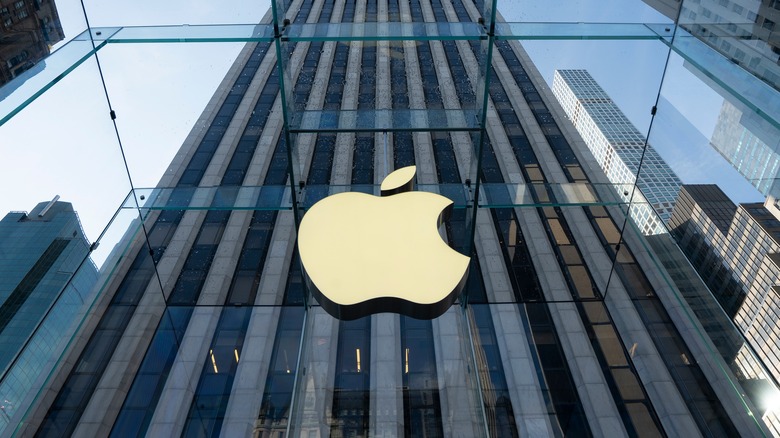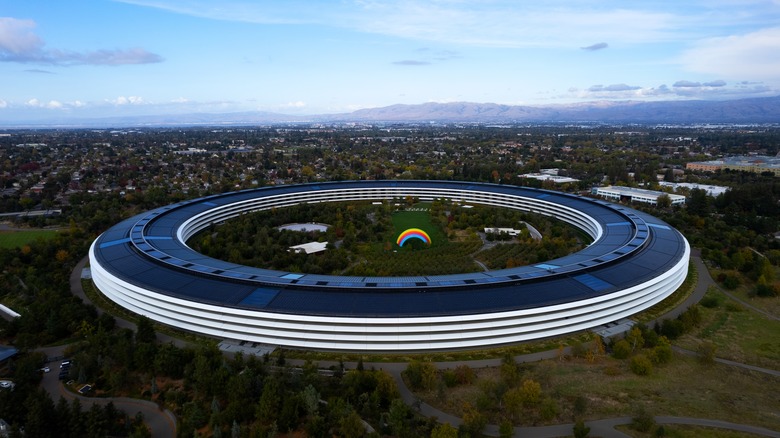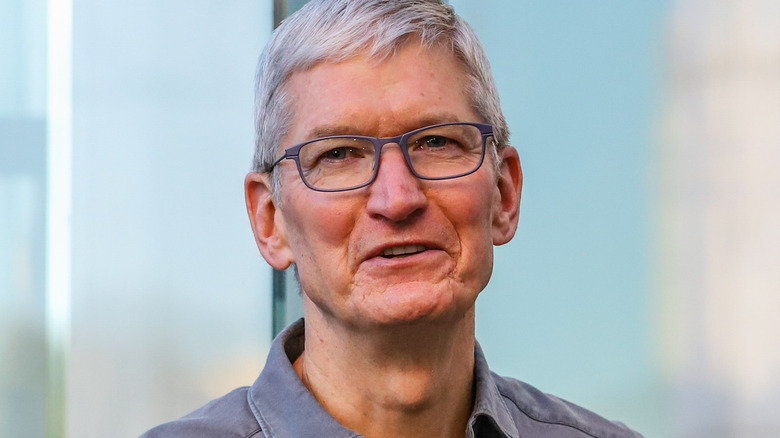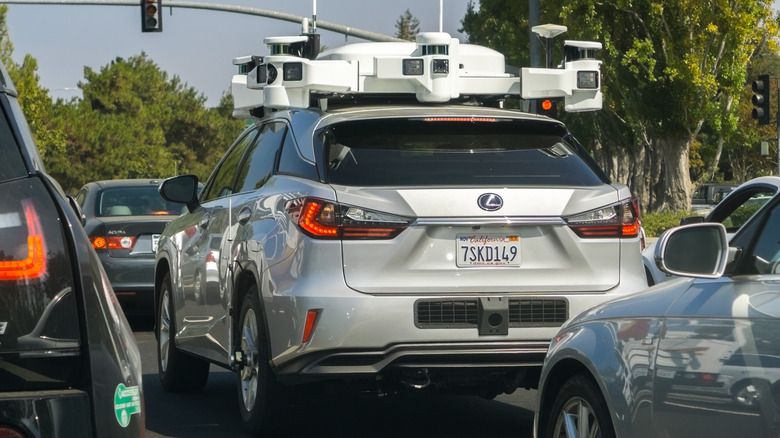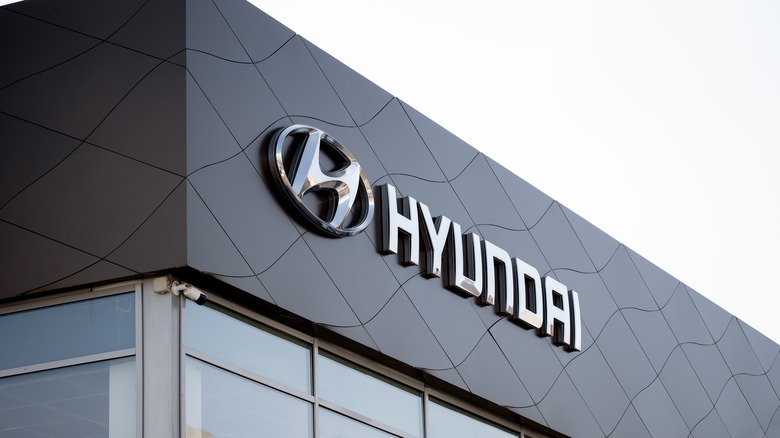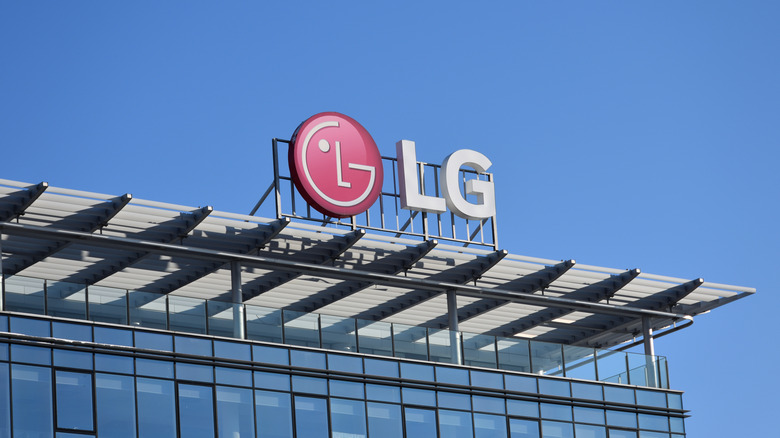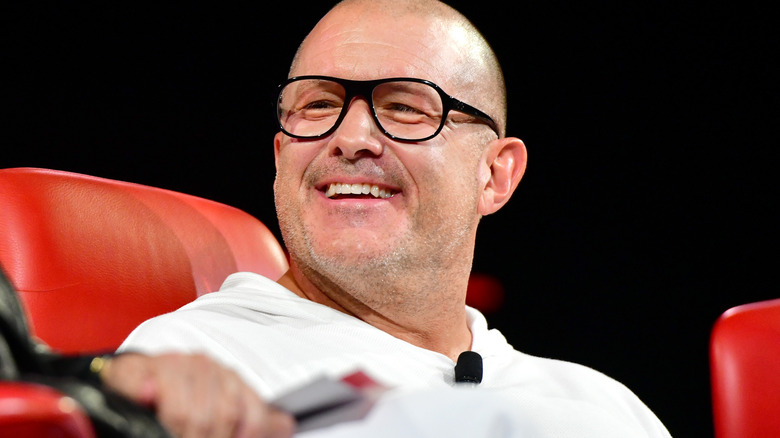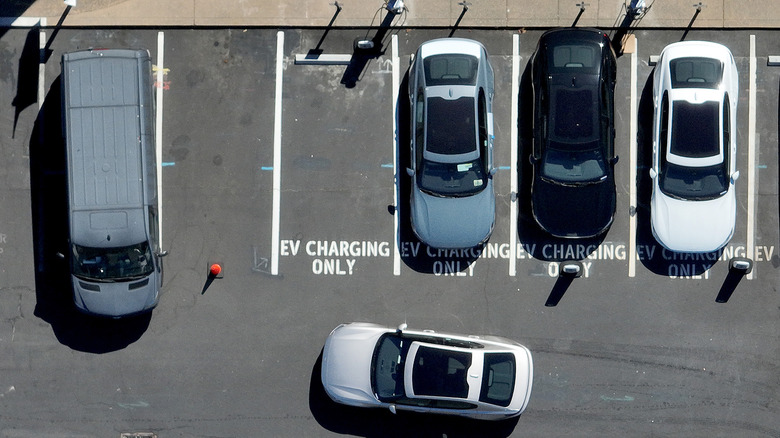Apple Car Expectations: Release Date, Price, And Rumors
Despite never officially confirming its intentions to build a car, Apple has been working on its secretive "Project Titan" for almost a decade now. Exactly what the project entails is still unclear, especially since there's been a steady stream of sometimes conflicting rumors from various sources over the years. However, what has been confirmed is that Apple has considered the possibility of entering the car industry with a self-driving car, and by some accounts, may have a finished product ready to launch to customers by 2026.
The road to a potential Apple car has been a rocky one, and the project has reportedly undergone several direction changes as a result of management disagreements and development setbacks. As any startup carmaker knows all too well, the difference between designing a car and actually putting it into production is night and day, and even though the rumor mill gives some idea of Apple's current plans, it's possible that they might change again before the long-awaited car ever becomes a reality. For now, though, here's everything we know about Apple's biggest project since the iPhone.
Project Titan origins
The first rumors of an Apple car project began circulating in 2014, when a number of Apple engineers were hired for a new, highly secretive development division. Investigations by AppleInsider in 2015 uncovered the existence of a shell company supposedly linked to Apple, with offices mere minutes' drive away from the California-based tech giant's headquarters. Registered as "SixtyEight Research," the company had unusually high security around its offices, and no public information available about its work.
Throughout 2015, reports continued to emerge about the construction of a "repair garage" at the SixtyEight facility, as well as a number of high-level employees at leading carmakers taking mysterious new jobs at Apple. The company also leased a second facility the same year, reportedly to test out its prototype autonomous vehicles. At this point, development was still in its early stages, but car industry rivals were beginning to take notice. In a 2016 interview with the BBC, Tesla CEO Elon Musk called Apple's car "an open secret," and claimed that over 1,000 engineers were working on the project at the time.
The development process
If the years of rumors about Apple's first car are to be believed, the project has suffered from a lack of direction. This has impacted the development process. Every year, the leaks have indicated a slightly different vision for what the finished product would look like. Initially, the plans suggested that a fully autonomous electric car was in the works. However, in a 2017 interview with Bloomberg, CEO Tim Cook confirmed Apple was developing "autonomous systems" for cars, but stopped short of saying an actual car was in development. Notably, he called the development "the mother of all AI projects," and stressed that self-driving cars were only "one purpose" of what these systems could be used for.
A report by The Information claimed that the initial Apple car design featured four seats that face each other and a curved roof like a Volkswagen Beetle. There were reportedly plans to get an exemption from the NHTSA so that the car could ship without a steering wheel or pedals. However, these plans soon ran into trouble, not least because the all-important autonomous driving system that the car relied on wasn't quite as capable as the company had initially hoped.
Development problems
Early test drives of Apple's self-driving tech fitted to a fleet of Lexus cars were reportedly plagued with problems, including the car failing to give way to a pedestrian, clipping curbs at the side of the road, and having trouble with staying in lane. This wasn't unusual for such a project — every self-driving program has had its fair share of on-road failures — but if Apple's initial design was to be used, there would be no manual controls for a driver to take over in an emergency. Clearly, that would be a recipe for disaster, and so a rethink was needed if the company was to continue the project.
In 2018, it was announced that Apple had partnered with Volkswagen to develop a fleet of autonomous T6 Transporter vans to shuttle employees around Apple's campus. This caused plenty of speculation that the two could work together to produce Apple's car, but recent comments by Volkswagen's CEO Herbert Diess seem to put that theory to rest. Per Reuters, he expressed doubt that Apple would enter the car market at all, claiming he was sure the tech giant wanted to launch in-car software but not that it would make a vehicle of its own.
Problems with partnerships
Volkswagen isn't the only manufacturer to have had its name bandied about in the Apple rumor mill, only to shut down those rumors shortly after. Hyundai also confirmed it was no longer working with the Cupertino-based company in 2021, after announcing that both firms had held talks only a month earlier. This was reportedly down to disagreements over Hyundai's status in the partnership, as the South Korean automaker wanted to be seen as an equal partner, but Apple reportedly wanted it to serve as a supplier, much like Foxconn, the maker of the iPhone.
BMW also flirted with the idea of licensing parts of its i3 electric car to Apple in the early days of Project Titan, but much like Hyundai, backed out over its unwillingness to be seen as a parts supplier to a big tech company. Incidentally, the BMW executive overseeing initial talks was Herbert Diess, who now serves as Volkswagen's CEO and recently played down the suggestion that Apple was still looking to develop its own car.
Potential production partners
That leaves an increasingly small pool of candidates from which Apple could choose to manufacture its car, but there are a few key players who, so far, haven't ruled themselves out. A joint venture between LG Electronics and Magna International, called LG Magna e-Powertrain, was reported by The Korea Times to be "very near" to signing an agreement to produce Apple EVs in 2021.
One of Apple's biggest production partners is also in the running: iPhone maker Foxconn has already signed a deal with Fisker to produce SUVs starting in 2023, so it's possible that the Apple car is next to follow. However, there's always a chance that Apple will choose to go it alone if it does launch its own car — after all, it's already managed to hire plenty of talent from big auto manufacturers, and so assembling a team with the expertise to develop its own production plant doesn't seem out of the question.
Losing top talent
Apple has proved its dedication to Project Titan over the years by poaching many senior engineers and executives from other companies, but it hasn't had things all its own way. Apple bought Drive.ai, a self-driving car startup on the verge of bankruptcy in 2019, but chose not to keep many of its engineers, instead keeping its assets and intellectual property. Many of those engineers, in turn, went to work for one of Apple's rivals. Around the same time, Jony Ive, one of the company's most prolific product designers and a close collaborator with Steve Jobs, left Apple after becoming disillusioned with the company. Ive also reportedly had close links with the car project, although his exact role was never disclosed.
Titan's project lead Doug Field was then headhunted by Ford in 2021, taking his considerable expertise with him, having previously worked as a Senior Vice President at Tesla. Later that year, Michael Schwekutsch, another former senior Tesla engineer specializing in powertrains, left Apple for a flying taxi startup. With many of the key figures involved in Project Titan departing for rivals, perhaps it's no surprise that the project has seen so many reported changes of direction over the years.
Production locations and research labs
In addition to its alleged headquarters under the name "SixtyEight Research," Apple has also reportedly leased or purchased a number of additional facilities for the project. In 2017, Business Insider tracked down the location of a hidden office in Berlin, Germany, which reportedly housed between 15 and 20 employees, some of whom came from mapping startup Here. Others had previously worked at Ford and Mercedes-Benz. Apple has never publicly disclosed which division its Berlin-based employees have been working on, and it's possible that they were not directly involved with Project Titan. After all, Apple has been making some serious improvements to Apple Maps in recent years, which would tie in with the acquisition of ex-Here employees.
Another facility with potential links to Apple's car project is a manufacturing facility in Milpitas, California. The company signed a 10-year lease on the large campus in 2018, and reports quickly linked it to the self-driving development program. However, five years later, it's still not been disclosed exactly what the facility is developing.
Apple's changing vision
In the years since Apple first launched its electric self-driving car ambitions, the automotive industry has changed immensely. Plenty of startups have attempted a similar formula to Apple's original plan, promising a mix of electrification and self-driving tech, and Tesla has expanded from a promising newcomer into one of the industry's most influential players. Bloomberg reported in late 2022 that Apple's plans had been scaled back once again, and although a car was still planned, it wouldn't be fully autonomous.
It was also reported that the car would retail for under $100,000, pitting it against an increasingly wide field of EV rivals, and that it wouldn't be released until 2026. That's a significant departure from the initial plans for Project Titan, and it's worth noting that, even if the report is accurate, plans may well change again before the car is actually unveiled. For now, though, it remains to be seen exactly what innovations Apple will debut to make the car stand out from its competitors — and it will need to stand out, given how many EVs from both major carmakers and startups are set to launch between now and 2026. That is, if the long-awaited car does in fact make it to customers in the end.
